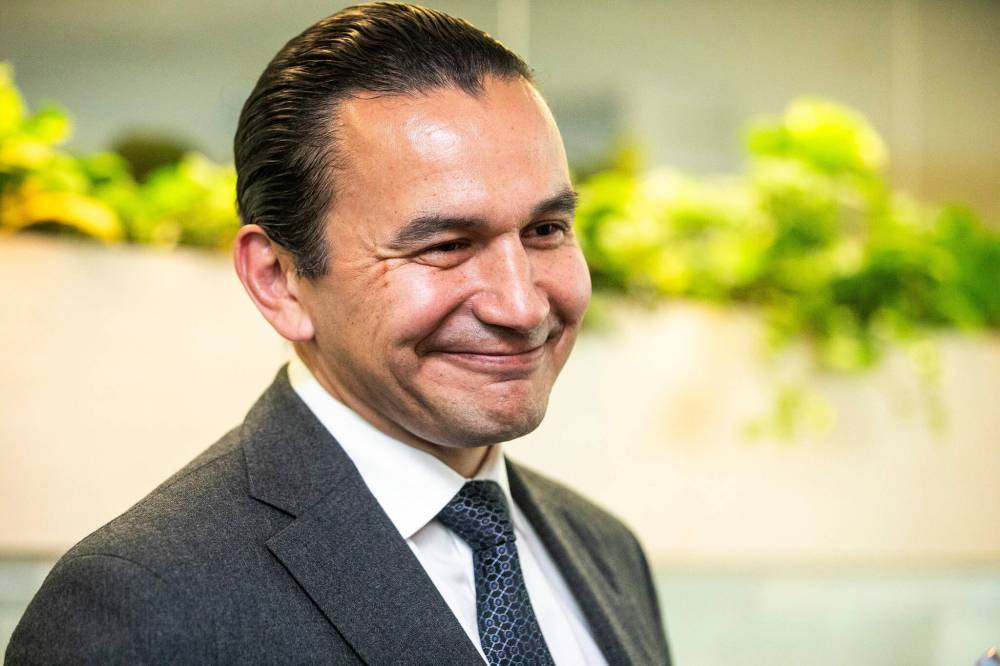Premier touts shared commitment for Trans-Canada twinning
Advertisement
Read this article for free:
or
Already have an account? Log in here »
To continue reading, please subscribe:
Monthly Digital Subscription
$1 per week for 24 weeks*
- Enjoy unlimited reading on winnipegfreepress.com
- Read the E-Edition, our digital replica newspaper
- Access News Break, our award-winning app
- Play interactive puzzles
*Billed as $4.00 plus GST every four weeks. After 24 weeks, price increases to the regular rate of $19.95 plus GST every four weeks. Offer available to new and qualified returning subscribers only. Cancel any time.
Monthly Digital Subscription
$4.99/week*
- Enjoy unlimited reading on winnipegfreepress.com
- Read the E-Edition, our digital replica newspaper
- Access News Break, our award-winning app
- Play interactive puzzles
*Billed as $19.95 plus GST every four weeks. Cancel any time.
To continue reading, please subscribe:
Add Free Press access to your Brandon Sun subscription for only an additional
$1 for the first 4 weeks*
*Your next subscription payment will increase by $1.00 and you will be charged $16.99 plus GST for four weeks. After four weeks, your payment will increase to $23.99 plus GST every four weeks.
Read unlimited articles for free today:
or
Already have an account? Log in here »
Hey there, time traveller!
This article was published 12/08/2025 (196 days ago), so information in it may no longer be current.
Manitoba has pledged to work with Treaty 3 First Nations and recognize Anishinaabe law in the twinning of the Trans-Canada Highway.
Premier Wab Kinew and other members of cabinet travelled to Powwow Island on Lake of the Woods Tuesday to mark the occasion.
Following a ceremony at Wauzhushk Onigum Roundhouse, located about 220 kilometres east of Winnipeg, government leaders signed a memorandum of understanding with the Niiwin Wendaanimok Partnership.

MIKAELA MACKENZIE / FREE PRESS FILES
“Everybody will benefit from (this work), when there’s a safer Trans-Canada from Winnipeg to Kenora,” Premier Wab Kinew said.
The collective representing four First Nations located near the Manitoba-Ontario border — Wauzhushk Onigum, Washagamis Bay, Shoal Lake 40 and Niisaachewan — hailed the event as historic.
The agreement pertains to the widening of an approximately 16-kilometre section of the cross-country highway between the interprovincial crossing and Provincial Road 301 near Falcon Lake.
Tree-clearing and other preliminary work to establish a four-lane highway began more than two years ago under Manitoba’s former Progressive Conservative government.
The parties who met Tuesday agreed to work together throughout the planning and design stages of the Highway 1 project.
Kinew told reporters that he was pleased to kick things off “in a good way” by participating in ceremony and talking to Anishinaabe leaders in the region about their priorities.
“Everybody will benefit from (this work), when there’s a safer Trans-Canada from Winnipeg to Kenora,” the premier said.
Kinew was joined by Lisa Naylor, minister of transportation and infrastructure, and Indigenous Futures Minister Ian Bushie.
First Nations leaders recently offered them tobacco at the Manitoba legislature as a symbol of their desire to respect traditional protocols, the premier recalled. “We came here to honour that,” he said.
Niiwin Wendaanimok’s Natalie Daniels said it’s a major milestone that recognizes Anishinaabe laws and governance processes and “the importance of free, prior, and informed consent” in infrastructure development.
For Kinew, incorporating Manito Aki Inakonigaawin (the Great Earth Law) will involve considering the environment, economy, health and safety, and the principle of respect in practise.
He said the parties’ foundational agreement will prove especially helpful when it comes time to navigate twinning a complex section of roadway near Barren Lake. The existing westbound stretch crosses the lake at present.
The partners will need to pick a route that protects the waterway, Kinew said.
maggie.macintosh@freepress.mb.ca

Maggie Macintosh
Education reporter
Maggie Macintosh reports on education for the Free Press. Originally from Hamilton, Ont., she first reported for the Free Press in 2017. Read more about Maggie.
Funding for the Free Press education reporter comes from the Government of Canada through the Local Journalism Initiative.
Every piece of reporting Maggie produces is reviewed by an editing team before it is posted online or published in print — part of the Free Press‘s tradition, since 1872, of producing reliable independent journalism. Read more about Free Press’s history and mandate, and learn how our newsroom operates.
Our newsroom depends on a growing audience of readers to power our journalism. If you are not a paid reader, please consider becoming a subscriber.
Our newsroom depends on its audience of readers to power our journalism. Thank you for your support.
History
Updated on Thursday, August 14, 2025 9:51 AM CDT: Corrects location of Wauzhushk Onigum Roundhouse


